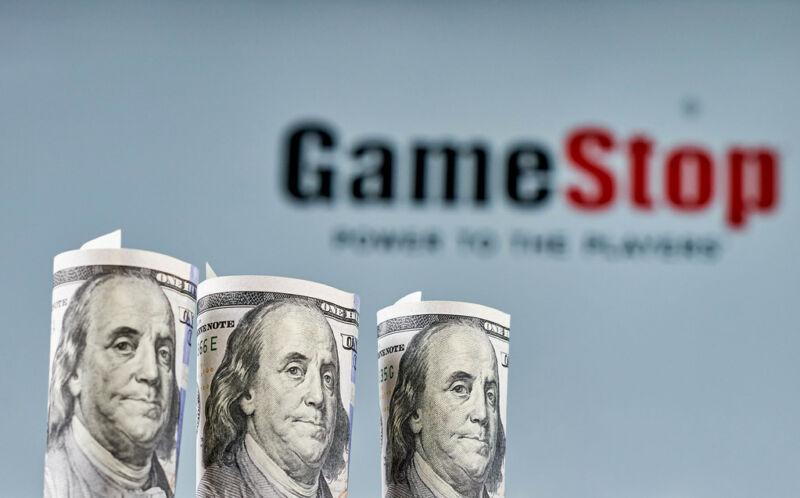GameStop stock falls sharply amid 5M-share sales plan, SEC investigation

GameStop’s quarterly earnings report, released last night, contained relatively good news for the embattled retailer, including a smaller-than-expected operating loss and the company’s first year-over-year increase in quarterly revenues in years. But GameStop’s heavily inflated stock price is down significantly in morning trading on news that the company plans to sell more shares and the announcement that it is cooperating with a Securities and Exchange Commission investigation into the “meme stock” phenomenon.
In what CEO George Sherman called a “strong start to the year,” GameStop’s net sales were up over 25 percent to $1.3 billion in the fiscal quarter ending on April 30. That’s despite “a roughly 12 percent reduction in the global store fleet due to our strategic de-densification efforts and the continued store closures in Europe during the quarter due to the COVID-19 pandemic.” The increased sales weren’t enough to make GameStop profitable again, but they were enough to reduce quarterly losses to $66.8 million (or $29.4 million if you take out one-time payments), down from $108 million a year ago.
If they want to buy, we want to sell
More than that, the last quarter saw GameStop’s bottom line buoyed by the sale of 3.5 million shares of additional stock—$551 million worth—to a rabid market willing to pay an average of nearly $160 per share (compared to the sub-$20 share price at the beginning of the year). Thanks largely to that infusion of cash, GameStop has eliminated $504 million in long-term debts it had on its balance sheet a year ago, and it is now sitting on $770.8 million in cash on hand, up from $583.9 million a year ago.
In this way, the meme-driven investors driving up GameStop’s stock price have provided a genuine financial cushion that the company can use to weather the prospect of more difficult quarters ahead, at least in the near term.
GameStop’s recent stock offering was so successful, in fact, that the company now says it’s hoping to sell up to 5 million more stock shares “for general corporate purposes as well as for investing in growth initiatives and maintaining a strong balance sheet.” While that stock would be worth over $1.5 billion at yesterday’s near-record close of $302.56 per share, there’s no guarantee that the stock price will stay so high by the time GameStop manages to make its next at-the-market offering.
Indeed, as of this writing Thursday morning, GameStop stock is hovering around $256 a share, off over 15 percent despite the stronger-than-expected earnings report [Update: Gamestop stock closed Thursday at $220.39, down over 27 percent from the previous day’s closing price]. That could reflect a market realization that all the extra stock GameStop is selling dilutes the ownership stake represented by the company’s existing stock. Then again, GameStop’s stock price has been untethered from the company’s fundamental earnings potential for months now. And while GameStop stock lost about 33 percent of its value the day after its worse-than-expected 2020 fiscal earnings report, it gained back all that value and more the very next day.
SEC probes and new executives
The market could also be reacting to GameStop’s announcement that the SEC asked the company on May 26 to produce documents and information as part of an investigation into the “meme stock” trading that has driven such volatility for the stock this year. “We are in the process of reviewing the request and producing the requested documents and intend to cooperate fully with the SEC staff regarding this matter,” GameStop said in a statement. “This inquiry is not expected to adversely impact us.”
GameStop also followed the official naming of Chewy co-founder Ryan Cohen as chairman of the board with the appointment of two Amazon veterans in its executive team, Matt Furlong as CEO and Mike Recupero as CFO, effective June 21. That could be a good sign for Cohen’s stated goals of “building a powerful e-commerce platform that provides competitive pricing, broad gaming selection, fast shipping, and a truly high-touch experience that excites and delights customers.”
But Cohen yesterday refused to lay out any details of his plans for making that pivot, saying instead that “you won’t find us talking a big game, making a bunch of lofty promises, or telegraphing our strategy to the competition.”
That hasn’t impressed at least some of the few analysts that are still tracking the volatile stock. “Investors deserve more than memes to value a company’s fundamental, long-term prospects,” Baird analyst Colin Sebastian wrote in a note to clients.
https://arstechnica.com/?p=1772099